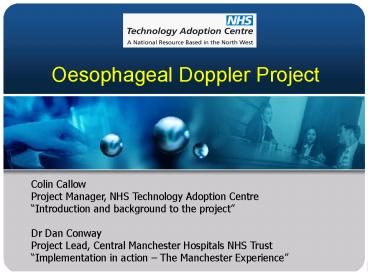Colin Callow PowerPoint PPT Presentation
1 / 24
Title: Colin Callow
1
Oesophageal Doppler Project
Colin Callow Project Manager, NHS Technology
Adoption Centre Introduction and background to
the project Dr Dan Conway Project Lead,
Central Manchester Hospitals NHS
Trust Implementation in action The Manchester
Experience
2
Introduction
- Intra-operative cardiac output monitoring using
oesophageal Doppler technology - Implementation project commenced in January 2008
- 3 Clinical Implementation sites
- Whittington Hospital NHS Trust, London
- Derby Hospitals NHS Foundation Trust
- Central Manchester and Manchester Children's
University Hospitals Trust
3
Why Compelling Clinical Evidence but still
minimal adoption
- Haemodynamic optimisation guided by cardiac
output monitoring using oesophageal Doppler
technology and other interventions can
significantly reduce both the rates of post
operative complications and mortality, as well as
significantly reducing length of stay and overall
number of ICU/HDU bed days used. - ISOG 2007
- Goal-directed intra-operative fluid
administration results in earlier return to bowel
function, lower incidence of postoperative nausea
and vomiting, and decrease in length of
postoperative hospital stay - Gan TJ Anesthesiology 2002
- Seven randomised trials have shown that simple
use of cheap ultrasound technology to reduce
length of stay consistently by 2-3 days in
elective abdominal surgery. The evidence is clear
here and changes should be rapidly implemented - Darzi A ,2007 Healthcare for London . A
framework for Action p71
4
Aims of the project
- To implement minimally invasive cardiac output
monitoring utilising oesophageal Doppler
technology to optimise intra-operative fluid
replacement management for patients undergoing
major surgery. - To integrate the technology into revised clinical
pathways , identifying and addressing
implementation, technology and other integration
issues identifying where additional changes to
the pathway or service may be required to unlock
the full clinical and operational benefits of the
technology. - To produce a project report, how to why to guide
and business case to support adoption of the
technology across the wider NHS.
5
- Implementation in Action
6
Oesophageal DopplerImplementation Project
- Daniel Conway
- Consultant Anaesthesia and Intensive Care
- Manchester Royal Infirmary
- Dec 2009
Conflict of Interest Dr Conway has not received
funding , sponsorship or has any financial
interest in Deltex Medical
7
The High Risk Surgical Patient
- Major surgery is the equivalent of running a half
marathon - Over 20,000 patients die a year following surgery
most have co- existing disease - Complications leading to unplanned ICU admission
have poor outcomes Jhanji Anaesthesia 08 - Recovery often takes months
8
Evidence Guidelines
9
Patient Journey through major surgery
HOME
Pre- op preparation
Post-op care
Recovery and rehabilitation
Intra-op Care
10
Improving Surgical Outcomes
- Improve Pre-Operative Preparation
- Assessment of fitness
- Prehabilitation Nutrition, exercise
- Improve Peri-Operative Care
- Goal Directed Fluid Therapy
- Minimal access surgery
- Oxygen, glycaemic control, drug Rx
- Improve Post-Operative Care
- Critical Care Levels 1, 2 or 3?
11
Oesophageal Doppler. A Great British Invention
12
How ODM Improves Outcomes
- Most surgical patients dehydrated
- Difficult to measure fluid loss with standard
monitoring of pulse and BP - Optimising Cardiac Output improves tissue
perfusion without fluid overload - Improved perfusion reduces complications heart,
gut, renal - Reduced complications reduces LOS 2.6 days
13
Patient Journey with ODM
HOME
Pre- op preparation
Post-op care ?ODM Guided
Enhanced Recovery ?complications
Intra-op Care ODM Guided
14
Oesophageal Doppler me
- 97 used Doppler during training
- 99-02 Lead author of 2 centre RCT showing
benefit - 01 Consultant appointment. Unable to persuade
the organisation to adopt - 05 Equipment Committee Lead
- 06 Clinical Trial of ODM
- 07 Business casehalf a monitor funded
15
Technology Adoption Project
- Opportunity to re-vitalise interest
- Project team 3 centre support
- An ideal project for TAC
- Halo effect
- National project raise Department profile
- Fits with Trust innovation agenda
16
Adoption Project a new way of looking and
thinking
- Project Plan
- Engage Management
- Engage Clinicians
- Controlled Implementation Plan
- Business Case Development
- Demonstrate Effective Implementation
17
Stakeholders
Trust Clinical Team
Company
Trust Management Team
Patients
Commissioning and Procurement
Strategic Health Authority
18
Engage Management
Silo Budgeting
19
Engaging Management
- Overcoming Divisional silos to recognise benefit
for the organisation - Address Fears
- What if ODM sits on shelf
- What if we use loads of probes
- Controlled Implementation
- Costs and benefits balance
- Get a manager to co-author document
- Have support of MD and Chair of Trust
20
Engaging Clinicians
- How will it improve patient care ?
- Critically appraise studies
- PROMs in the real world
- Limited Implementation
- Champion approach?
- Stick with narrow evidence base
- Training
- Survey all consultants prior to project
21
Successful Adoption
- Implemented in all surgical areas
- Used to optimise fluid therapy
- Helping to streamline discharge procedures
- Development of an adoption plan to share across
the NHS
22
Demonstrating Effective Implementation
- Web based data collection
- Appropriate use of device
- Patient Related Outcomes
- Post-Op Morbidity
- Length of Stay
- Delays to discharge
- Financial Impact
- Qualitative data
23
Progress Dec 08
- 10 monitors purchased
- Monthly purchase of consumables
- Staff training complete
- Online audit data collection forms in use at 3
sites - Other 2 sites gt200 patients
24
Summary
- Evidence base is starting point
- Need to Create Culture
- Clinicians engage management
- Improvements for patients are demonstrated
- New technology embraced
- Experiences shared
25
Thank you
A Step Change We Can Believe In
26
Project Team at MRI
- 9 Anaesthetic Champions
- Surgeons
- Audit Facilitator
- Project Manager at TAC
- Support from Directorate and Divisional
managers
27
Outcomes to be Reviewed
- Appropriate use of device
- Patient Related Outcomes
- Post-Op Morbidity
- Length of Stay
- Delays to discharge
- Financial Impact
- Qualitative data
28
Questions ?

